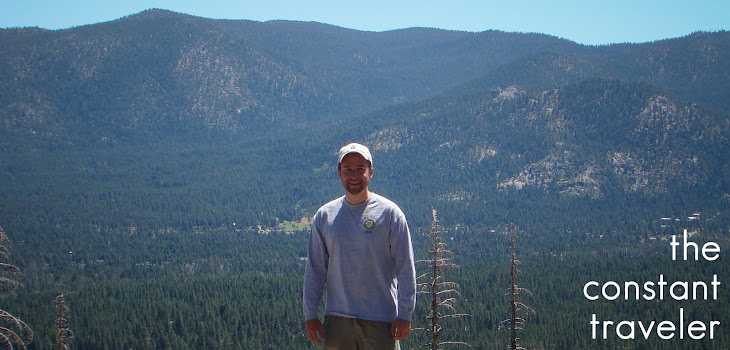Readjusting to your culture after spending weeks or months in another is a very tricky matter for me--because I tend to want to forget it. The experiences I've had abroad have changed my life, altered my worldview, and challenged me; but I have an uncanny ability to walk between my world and the other, and hang up that world on a coat-rack, and for awhile forget about it.
After now three experiences abroad, I know why this is the case. Going abroad and immersing yourself in a radically different environment changes the fundamentals of your life perspective. That's a powerful, powerful thing, considering that human beings like their first life perspective quite a bit (it's called a "comfort zone"). My comfort zone is my house in Lodi, with the vineyards green and the sky blue in the summertime, and toast and fresh peaches in the morning on our patio.
It's funny, though, that I react like this when returning home. Because after a brief period of toast and peaches and vineyards, I start getting antsy. I keep looking at my coat rack and dream of Germany, Oxford, and now, only seven days removed, Tunisia.
What's happening to me is a phenomenon I'd like to label after an F. Scott Fitzgerald's quote: "The test of a first-rate intelligence is the ability to hold two opposed ideas in the mind at the same time, and still retain the ability to function". When we live in an environment so innately different from ours, of course it's difficult to readjust to your home culture--because you now have had the experience of living, breathing, thinking, and talking in opposing environments. It's natural that we react with aversion techniques, like hanging up your worlds on a coat rack, or refusing to go outside your house again for fear of you having to stretch your mind to difficult extents again.
These natural reactions are even more understandable in our current American society. There is a curious aversion in the American psyche to thinking outside our comfort zone, both in red and blue states. What makes this aversion less curious and more ominous is the fact this is tearing our country apart. Immigrants are seen as the enemy because they'll "change our society". We don't want to talk about education reform, health care reform, or any kind of government reform because "it's too hard", there are "too many different views", and "people bicker too much".
Why am I seemingly blending a study abroad experience with current American politics? Let me confuse you even more. Perhaps one of the most impressive things about Tunisia was its gaping identity crisis, and the fact that a very undemocratic force held the country together otherwise. With an incredible array of diverse inhabitants (from Phoenicans to the Romans to the Italians and French) and its confunding geographic position (on the Mediterranean, in North Africa, across from Europe, and a member of the Arab World), Tunisians have had to balance multiple languages, lifestyles, and ways of thinking for most of their history. Granted, major decisions of their society have been conveniently chosen for them by dictatorships (I say "convenient" because think about the difficulty of having such diversity translate into political decisions), but the fact remains: Tunisia is a very successful country, despite having few cultural cornerstones.
I argue, that in many respects, Tunisians have more of a "first-rate intelligence" than Americans, despite the two countries sharing several similarities. Both are incredibly diverse societies. Both have had to balance multiple languages, lifestyles, and ways of thinking. The question, then, is why have Tunisians become more adept at living in such a society?
Going back to the "convenience of dictatorship" idea, this could very well be the reason why it is so easy for Tunisians to accomodate the diversity. But I would actually shake my head even more at America. Despite all our flaws, America is the freest nation on earth, and insures the most rights and liberties to its people. Shouldn't the freedom to express and converse about ideas lead to an even better, more open and accomodating society? If we, in our free society, can't be as accomodating to diversity as those not in a free society... If we are to be an example--a "shining light on a hill" to the rest of the world, then why, as the nation with all the aces in our hand, are we ignorant, scared of, and have our backs turned to the concept of being a nation with "a first-rate intelligence"?
In reading over this essay, I realized that I never defined why a first-rate intelligence is better than the status quo. It's actually a profoundly simple explanation. Have you ever talked with a human being? Have you ever watched a movie? Have you ever lived with someone else? Have you ever had a friend, a lover, a sibling or parents? If you answered yes to any one of these questions, you have a first-rate intelligence. You are holding in your mind a complex web of ideas, perspectives, ways of thinking and life, that are fundamentally different than yours. But why do they not scare you? Because you have accommodated them. Over time you expanded your comfort zone--added more coats to the rack--and realized your life was being all the more enriched and rewarded for holding more and more conflicting ideas in your mind.
My challenge to you is to take this same approach--an approach that we have instinctively taken for our entire lives--and expand it to include bigger, and more conflicting ideas. Humanity has been blessed with this gift, of this potential, to have a first-rate intelligence. It is my sincerest belief that the more we make use of it, the better our world will be.
Monday, August 10, 2009
Subscribe to:
Post Comments (Atom)


Amen, man. You've got a gift with words.
ReplyDelete-José